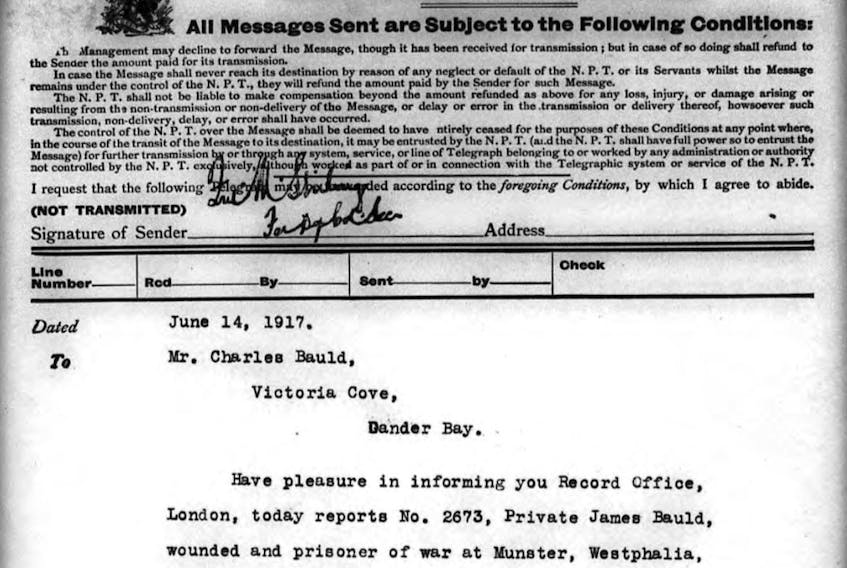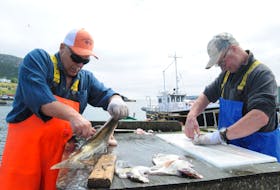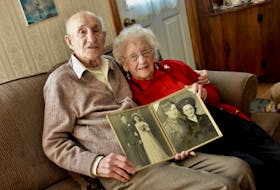On Nov. 11 Glenwood will host its inaugural Remembrance Day ceremony at 11 a.m.
The occasion became possible last week when the town and the Glenwood Heritage Society officially dedicated its first war memorial at the Glenwood Memorial Park.
The granite monument is adorned with a pair of red poppies and bears the names of 59 men — each from Glenwood — who served in the military during the First World War, Second World War, and the Korean War.
Searching the monument one will find brothers, fathers and sons. They were fox farmers, telegraph operators, railroad section men, lumbermen and trappers.
One of those men is Pte. James Bauld of Glenwood. Using information compiled through the extensive work by The Rooms in St. John’s it is possible to get a clear picture of Bauld’s service.
A fisherman originally from the small Gander Bay community of Victoria Cove, Bauld enlisted with the Royal Newfoundland Regiment at the age of 26.
The son of Charles and Jessie Bauld, he was one of eight men from Victoria Cove to enlist from 1915 to 1917. Each were fishermen and four of them were killed in action during the First World War.
For a fisherman to enlist was a risky move at that time. The cod stocks were plentiful and hauling them in required men. Any loss in manpower could mean disaster for a fishing family and drive them into poverty as a result.
Still, he enlisted on May 1, 1916 and headed for St. John’s to join the Newfoundland Regiment.
By Oct. 11, 1916, Bauld had left South Hampton, England bound for Rouen, France and joined First Infantry Battalion 11 days later on Oct. 22.
A month later he was wounded after taking a bullet to the left shoulder during a skirmish in France on Nov. 29, 1916. It came just 11 days after the end of the 140-day Battle of the Somme.
Shortly after he was admitted to the 6 General Hospital in Rouen and discharged on Dec. 12. He rejoined his battalion that Christmas Eve.
In April of 1917, Bauld was a part of the failed attack by the Newfoundland Regiment and the 1st Essex Regiment from the French village of Monchy-le-Preux in the Battle of Arras.
On the morning of April 14, the Allied Forces approached Arras from the east in an attempt to gain ground on an objective called Infantry Hill. A strong German counterattack had surrounded the forces and by 9 a.m. that morning, they were forced to surrender.
Telegraphs from Colonel Secretary John Robert Bennett tell part of the next piece of Bauld’s story.
On May 11, word of his capture had hit the shores of Victoria Cove. A telegraph addressed to Bauld’s father Charles informed him that his son was reported missing on April 14.
A few days prior, the Regiment had learned of Bauld’s capture and subsequent detainment at a camp in Munster, Westphalia, Germany. That was May 7.
Bauld was one of 153 regiment men who became a prisoner of war.
It wasn’t until June 14 when another telegraph would arrive in Victoria Cove. Imagine the relief and horror Charles and his wife Jessie must have experienced as they learned their son was alive, but was a prisoner of the enemy.
Bauld remained imprisoned in Germany until he was transferred to Switzerland for internment on Dec. 27, 1917. A dispatch to the war office on Jan. 2, 1918 confirmed this internment and on Jan. 3 his parents were informed of his movement.
Bauld didn’t make it back to England until June 14 when he was transferred from Switzerland to the King George Hospital in London. At this point, his shoulder injury was diagnosed as severe and had developed ankylosis — a stiffening of the joint.
It is here that Bauld’s military story reaches its conclusion. A couple of months after being moved to London, he was medically discharged from duty on Sept. 9, 1918.
He would return to his home in Newfoundland in November 2018.
His military story transpired over two years since his enlistment.
He was just 28.









